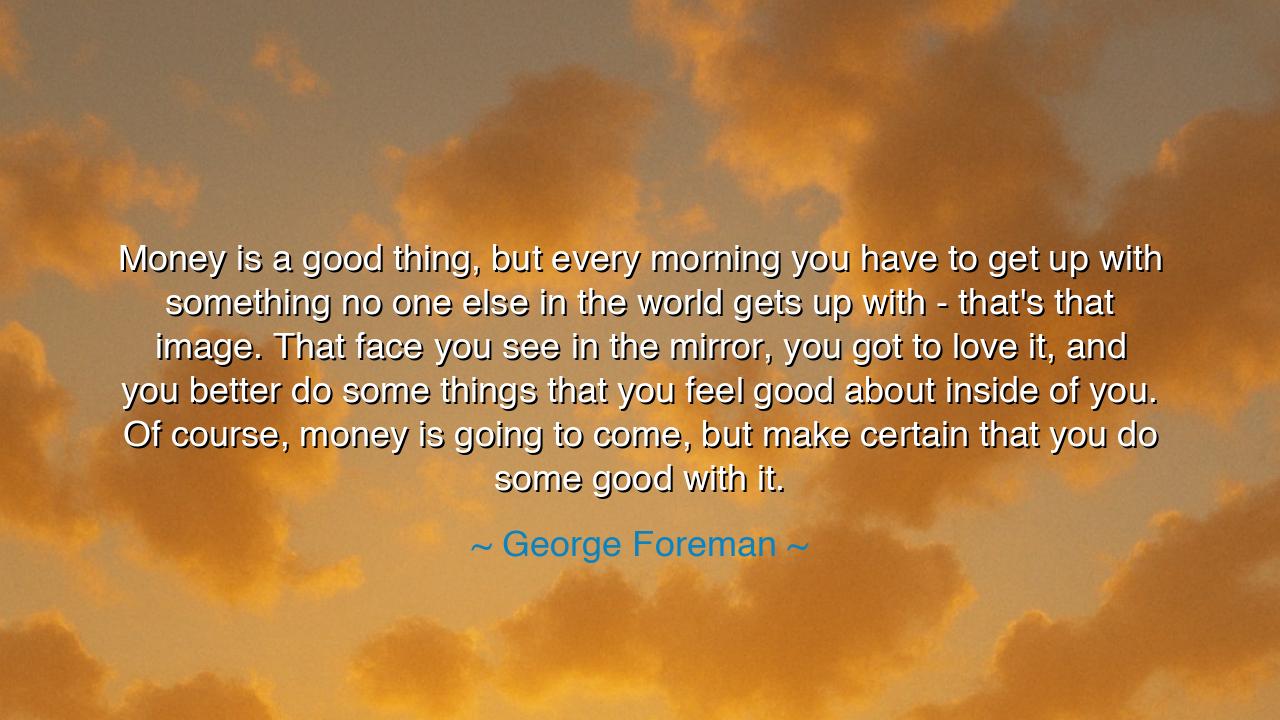
Money is a good thing, but every morning you have to get up with
Money is a good thing, but every morning you have to get up with something no one else in the world gets up with - that's that image. That face you see in the mirror, you got to love it, and you better do some things that you feel good about inside of you. Of course, money is going to come, but make certain that you do some good with it.






When George Foreman declared, “Money is a good thing, but every morning you have to get up with something no one else in the world gets up with—that’s that image. That face you see in the mirror, you got to love it, and you better do some things that you feel good about inside of you. Of course, money is going to come, but make certain that you do some good with it,” he spoke not merely as a boxer or a businessman, but as a man who had wrestled with life, victory, loss, and redemption. His words are a testament to the eternal truth: that wealth, while useful, is hollow without self-respect, inner peace, and the pursuit of virtue.
To rise in the morning and gaze into the mirror is a universal act, but in that act lies a trial of the soul. For the reflection is not merely flesh—it is the measure of one’s deeds, the record of choices, the silent witness of one’s own truth. Foreman tells us that money cannot disguise a face ashamed of itself. Riches may clothe the body in finery, but they cannot soothe the torment of a heart that has betrayed its own conscience. To love that face in the mirror, one must live in such a way that dignity, honor, and goodness shine brighter than any gold.
Foreman himself knew this deeply. Once the fearsome heavyweight champion of the world, he was celebrated for his power and feared for his fists. Yet after defeat and years of wandering, he was forced to confront emptiness. When he returned to the ring as an older man, many mocked him. But he fought not only for titles, but for self-redemption. Later, through business, he gained great wealth, yet he did not forget his own words: he poured his fortune into charities, youth programs, and communities. He proved that to do good with money is the highest use of it, and that the true victory is not in conquering opponents, but in conquering the self.
The ancients also spoke of this truth. Consider Marcus Aurelius, emperor of Rome, who ruled over vast riches and power. In his Meditations, he wrote that wealth and honor are fleeting, but virtue endures. He rose each morning to remind himself to act justly, to be honest, to remain humble, even as emperor of the known world. Like Foreman, Marcus knew that the image in the mirror mattered more than treasures or titles. For when the day ends, the soul must stand alone before itself, and no empire or fortune can purchase peace of heart.
History gives us too the example of Andrew Carnegie, who amassed unimaginable wealth during the rise of American industry. Yet in his later years, he dedicated that fortune to building libraries, schools, and foundations. He once said, “The man who dies rich dies disgraced.” This truth aligns with Foreman’s: money itself is neutral, but its nobility lies in how it is used. It can rot the soul with greed, or it can uplift generations when turned toward the service of others.
The lesson, then, is clear: seek first the love of the self that greets you in the mirror. Do not sacrifice your inner peace for wealth, nor deceive yourself that riches can hide shame. Live so that when you see your own eyes each dawn, you see honesty, compassion, and strength. If money comes—and it often will to those who labor with purpose—then treat it not as an idol, but as a tool. Let it be a servant of good rather than a master of greed.
Practically, this means we must anchor ourselves each day in values greater than wealth. Begin each morning with reflection. Ask yourself: am I proud of who I am? Do my actions honor the truth of my heart? If wealth is given to you, dedicate a portion of it to good—to the uplifting of others, to works that endure. And even if money is scarce, remember that dignity, kindness, and integrity are riches greater than coin.
Thus, Foreman’s words shine as both warning and encouragement. Money is fleeting, but the face in the mirror is eternal. Guard it, cherish it, and shape it through acts of goodness, so that each day you rise, you rise not in shame but in strength. For the true measure of a life is not the weight of gold, but the weight of the soul.






AAdministratorAdministrator
Welcome, honored guests. Please leave a comment, we will respond soon